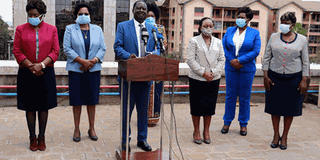Women leaders root for equality through BBI

From left: Kitui Governor Charity Ngilu, Gender CS Prof Margaret Kobia, Kirinyaga Governor Ann Waiguru, Homa Bay Woman Rep Gladys Wanga, National Gender and Equality Commission commissioner Priscilla Nyokabi when they met ODM leader Raila Odinga at his Capitol hill office in Nairobi, last week. The former Premier said BBI should capture women's aspirations. PHOTO | DENNIS ONSONGO | NATION MEDIA GROUP
A group of women leaders held talks with Opposition leader Raila Odinga in a push to achieve gender equality through the Building Bridges Initiative (BBI).
Meeting under the auspices of the Common Women Agenda (COWA), the women last week met Mr Raila at his Capitol Hill office in Nairobi.
Public Service and Gender Cabinet Secretary Prof Margaret Kobia, who led the delegation, said they discussed the implementation through budgetary allocation and prioritisation of Article 43 that focuses on economic and social rights to food, water, health education, housing and social security.
They also discussed the implementation of the not more than two-thirds gender principal in Parliament, both Senate and the National Assembly as well as the Executive.
ELECTORAL SYSTEM
Also discussed is the anchoring of the Propositional Representation Electoral System and ensuring it has protective ratios and formulas for women, youth and persons with disability.
Among other issues, the women also discussed the protection of women and girls against sexual and gender based violence.
The delegation also discussed on how to leverage on the Covid-19 pandemic, to chart an inclusive and sustainable path for the country that addresses the emerging issues of social and economic vulnerabilities of women.
“As women leaders, we call upon the support and leadership of President Uhuru Kenyatta and Mr Odinga to champion women’s agenda for an inclusive and prosperous Kenya. Women need to be included in decision-making as well as protection from gender violence. We want the issues that affect women captured in the document that is being prepared so that there is equality and equity,” said Prof Kobia.
Those who attended the meeting included Kitui Governor Charity Ngilu her Kirinyaga counterpart Ann Waiguru, Gender Chief Administrative Secretary Rachel Shebesh, Woman Representatives Gladys Wanga (Homa-Bay), Florence Mutua (Busia), Rosa Buyu (Kisumu) and Pricilla Nyokabi, a commissioner at the National Gender and Equality Commission (NGEC).
Waiguru said the meeting focused on a post Covid-19 scenario, gender issues in the ongoing constitutional amendment debate and national unity.
“We discussed post Covid-19 interventions to restore livelihoods among other issues to do with nation building,” she said.
Speaking after the closed-door meeting with the women leaders, Mr Odinga revealed that the drafting of the final BBI is at an advanced stage.
“We want all the issues raised by the women leaders captured in the final report,” said Mr Odinga.
Apart from the gender inequality in political field, women have also been facing the same predicament in the public service.
According to the Public Service Commission (PSC) baseline survey 2013–2014, the ratio of men to women in the public service stood at 70:30 with the ratio of women further reducing to 23 per cent at policy making levels.
TWO-THIRDS RULE
To bridge the gap, PSC issued a policy statement on the Diversity Policy for the Public Service published in 2016 that sought to rectify the anomaly.
The policy directed every public service institution to implement the principle that not more than two-thirds of its employees shall be of the same gender at all levels.
The policy also directed public institutions to put in place strategies within one year of coming into force to determine its gender balance ratios; establish the extent of the imbalance and put in place time-bound affirmative action programmes to ensure that the ratio of men to women progressively achieve the two-thirds gender rule at all levels.
However, despite the policy being in place, there still exist huge disparity in the public service as far as gender is concerned.
Apart from the gender rule, BBI has also emphasised on safety and security. The report also recognises sexual abuse and violence as one of the major security concerns in the country and recommends that security agencies draw up strategies that are responsive to victims of sexual violence.
BBI also lays emphasis on food, housing, security, education, health and family planning as some of the rights enshrined in the Constitution 2010 that need to be implemented by the government.





